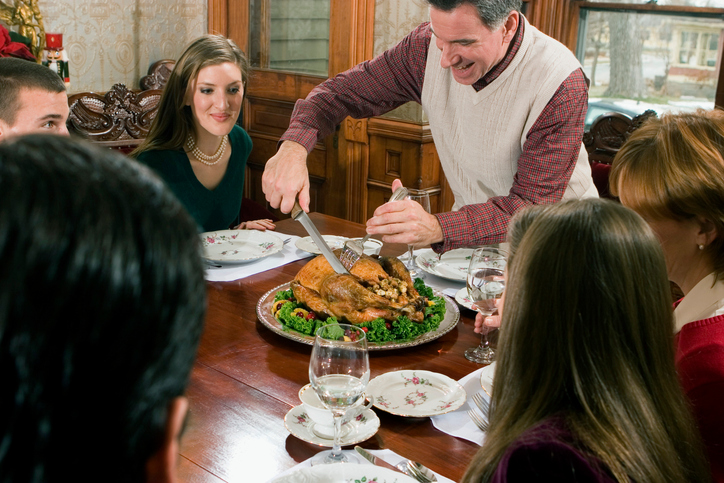It’s the most wonderful time of the year…but it’s also a stressful time of year, especially for those who have food allergies or intolerances. Because so many of the upcoming holidays focus on food, the food-allergic person has to focus on staying safe while eating at holiday meals—and if you’re hosting one of these meals, it needs to be top of mind for you as well. Many hosts feel intimidated or scared when they’re cooking a meal for someone with special dietary needs. Luckily, with some communication, creativity, sensitivity, and compromise, you can make the meal you’re hosting safe and successful for all your guests.
While there are many food allergies and intolerances, as well as other reasons why someone may have a restricted diet (for example, health conditions like irritable bowel syndrome), and the ways of handling each allergy, intolerance, or health issue are not all the same, there are some general best practices you can use as a starting point to help accommodate your guests with special dietary needs. The following tips can help.
Ask what their dietary needs are. Not all food allergies and intolerances are equal, and some are easier to accommodate than others. For example, some people with lactose intolerance may be able to eat some dairy if they take a lactase enzyme pill. On the other end of the spectrum, if your guest is allergic to peanuts, safety precautions must be taken to ensure that they don’t consume anything that contains—or is manufactured on equipment that processes—peanuts, as this allergy can be life-threatening. Ask your guest about their allergies and intolerances—what they can and can’t eat, and if any extra steps need to be taken in the kitchen during food preparation to ensure a dish is safe for them to eat.
Talk about how you may be able to accommodate. There are plenty of ways you may be able to help a guest avoid consuming something they’re allergic to while still allowing them to eat a significant portion of the meal. Could you make a Caesar salad and leave the dressing on the side, so that someone dairy-free can enjoy the greens too? Or leaving the mashed potatoes plain and provide a gravy boat full of gravy, so that those who are gluten-free can eat the taters (because gluten is often present in gravy)? Could you use sunflower butter in your dessert instead of peanut butter, so your nut-free friend can have some too? The possibilities are endless! Discuss these ideas with your guest ahead of time, and be open to ideas from them as well.
Go into detail about each dish you’re cooking. Help your guest be well-informed. Tell them every ingredient that is in a dish—even down to the spices you plan to add. This helps them make an educated decision about what they feel comfortable eating. It’s better to do this in advance instead of on the day of the holiday meal, so that both you and your guest know what to expect.
See if your guest would like to bring a dish or two. One surefire way to know that your guest has something safe to eat is by inviting them to bring their favorite dish to share!
If your guest is eating some of what you’re cooking, allow them to take their food first. This helps your guest avoid the risk of cross-contamination. For example, if Grandma dips the tongs from the stuffing into the dish of gluten-free mashed potatoes, those mashed potatoes can no longer be considered gluten-free. This type of situation is why it’s essential to let your food-allergic guest fill their plate first.
You could also see if your guest would be okay with bringing their own meal. This isn’t necessarily the ideal choice, but for those who have severe and/or multiple food allergies and intolerances, or other health conditions that severely restrict what they can eat, this is a way that can allow them to have a safe meal alongside their friends and loved ones. If you truly cannot accommodate their needs, and/or they do not feel safe or comfortable eating what you’re making, suggest they bring their favorite meal and dessert. Offer them fridge or freezer space to house the food, and allow them time and space to heat up the meal before everyone sits down at the table, ensuring that they can enjoy their meal at the same time as everyone else enjoys theirs.
Ask what their favorite kind of cookie or snack is. Food-allergic guests can often feel excluded at holiday mealtimes, and this can go a long way toward helping them feel included and cared about. Especially if your guest has to bring their own meal—but a kind thing to do even when they’re eating some of what you’re cooking—is to ask what their favorite treat that they can eat is. If they give you a specific type of food and brand that they know is safe for them, don’t deviate from it—buy exactly that item. Leave the package sealed until the guest arrives, and have them open it and serve themselves first to reduce the risk of cross-contamination.
Focus on more than just food. The holidays are about togetherness and spending time with family, friends, and loved ones. While the food is certainly an important part of the holiday gathering, make other facets of the get-together just as enjoyable. Plan fun activities that don’t revolve around food, like watching the Macy’s Thanksgiving Day Parade or your favorite holiday movie, taking a walk or doing some other fun activity outside like tag or touch football, taking family photographs, or having each person express what they’re grateful for.
For Health Advocate members
If you are a Health Advocate member with access to the wellness coaching component of our Wellness Program, call your coach for more tips to enjoy the holidays in a healthy way!




[…] is just around the corner—here’s how to make your meal healthier, accommodate guests who have special dietary needs, use up your leftovers, stress less, and get the whole family moving and having fun while […]
[…] If you know you have a food allergy, going to a holiday meal can be a stressful time. A good way to prevent an allergic reaction is by communicating with the host that you have a food allergy ahead of time so that they can prepare the meal accordingly. Here are some other great ideas. […]